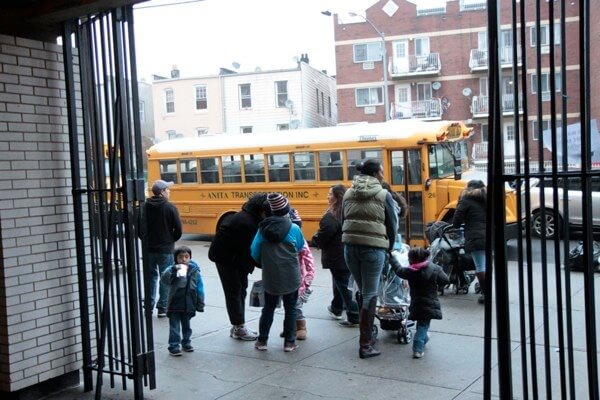By Naeisha Rose
Community education council leaders, School District 29’s budget director and its deputy superintendent were at Lorraine Hansberry Elementary School (PS 118) last week at 190-20 109th Road in St. Albans to discuss the $32.5 billion 2018-2019 fiscal budget for New York City’s 1.1 million students, as well as pensions for teachers.
Before the meeting started, fourth and fifth-grade students at PS 118 performed an African dance for Black History Month, followed by a step dance, then mimed to gospel music while dressed in black and adorned in colorful African wraps.
According to Principal Lezly Buchanan, the school does not have a formal arts program and fifth-grade teacher Michelle Lopez volunteers her time to help the students with choreography for dance routines.
Buchanan hoped with a representative of the superintendent’s office in attendance that the performance highlighted PS 118 and perhaps helped the school, which was named after a playwright, receive funding towards dance, music, theatre and writing programs.
The panel of CEC leaders and the deputy superintendent then rolled out their agenda, which was to remind parents about the city’s school survey meant to help institutions learn how they could improve, and another survey for questions to give to Schools Chancellor Carmen Fariña for a town hall meeting at PS 32 from 6 p.m. to 7 p.m. on March 26 at 171-11 35th Ave. in Flushing.
Deputy Superintendent Shawn Rux also reminded parents who had fifth graders to consider looking at the honors program at Jean Nuzzi Middle School — located in Queens Village — which will be starting in September, and to remember that if their child was born in 2014, they could apply for preschool for their tots.
Afterwards, the district’s budget director broke down how the massive budget would be allocated.
Districts 1 to 32, 75, 79 and 88 will receive approximately $14 billion to support educational services, according to the District 29 representative.
$10.4 billion was allocated for non-controllable costs. Approximately $6.9 billion of that went towards retirement pensions and paid benefits for education personnel. The remaining $3.7 billion will go towards centrally funded services on behalf of schools and students.
Those services included transportation, food, facilities, custodial costs and electrical bills.
An estimated $3.7 billion will be allocated towards special education, private schools, charter schools, and non-public schools, while another $3.7 billion will go towards support systems for schools.
An additional $700 million will go to superintendent officers, field support centers, family welcome centers and committees on special education.
Through the Fair Student Funding initiative, all public schools will receive $225,000 in foundational funding, approximately $4,100 per student weight. Schools in need of academic intervention that have special education programs, English Language Learners courses and that have extra sessions (Nursing, Health, Theater, Economics, Arts, etc.) will receive even more funds per student in those programs.
Kindergarten to fifth-grade students have a 1.00 weight ($4,100), middle school kids have a 1.08 weight ($4,428) and high-schoolers have a 1.03 weight ($4,223), according to the budget.
Reach reporter Naeisha Rose by e-mail at nrose

































